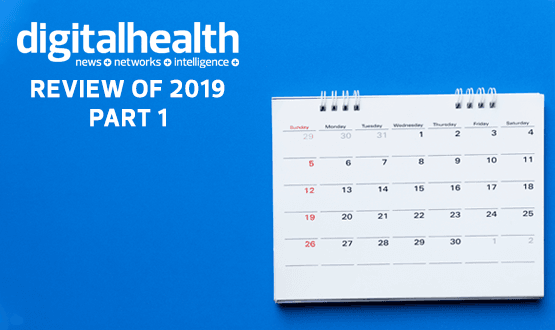Digital Health’s Review of 2019 Part One: January to June
- 27 December 2019

It’s been a roller coaster of a year in the NHS technology sphere, and we daresay elsewhere as well. We’ve had the creation of NHSX, lost several high-profile technology leaders to the private sector and, of course, everyone’s favourite event Digital Health Rewired 2019.
Just when you thought all the major news was done for the year and all that was left to do was eat mince pies, Santa has on more present up his sleeve for you – it’s the Digital Health News yearly round-up.
Let’s take a sleigh ride back through some of our biggest stories for 2019…

The start of 2019 was marked by two prominent players in NHS technology leaders leaving their posts.
NHS Digital’s first chief information security officer Robert Coles resigned after starting the job on 1 October 2018. Coles was formerly the security chief at GlaxoSmithKline.
Juliet Bauer, NHS England’s first chief digital officer stepped down from the role to join online GP provider LIVI. She joined the company later in 2019.
She had been a key figure in the ‘Empower the Person’ programme and oversaw a number of projects such as the NHS App and NHS 111 online.
In news that doesn’t involve high profile people leaving the NHS, high-street retailer Boots acquired tech company Wiggly-Amps in a bid to boost its stake in the digital healthcare sector.
The company, which provides a number of online services including check-in screens at GP surgeries, consultations and prescription services, operates as a separate entity to Boots under the name Engage Health Systems.
It was bought for an undisclosed fee.

February marked a new era for digital transformation in the NHS with the confirmation of NHSX, a new unit designed to bring together the Department of Health and Social Care, NHS England and NHS Improvement.
The unit would be responsible for coordination and consistency; setting standards; driving implementation; radical innovation; technology services; reforming procurement; cyber policy; digital capability; and governance.
The unit would be led by a new chief executive who would report to NHS England and Improvement chiefs.
On the topic of new jobs, NHS England launched a new advertising campaign encouraging people to apply for IT jobs, featuring the slogan “We are IT. We are Support. We are recruiting now”.
Digital Health News exclusively revealed a second wave of funding for the Local Health and Care Record Exemplars (LHCRE) was stealthily awarded by NHS England.
Three new sites were expected to receive £5.4m from NHS England, about two-thirds of the £7.5m awarded to each of the first five LHCRE sites in May 2018.
The wave two funding, however, was believed to be all capital, making it uncertain whether all the second wave LHCRE sites will be able to take the money.

TestCare, an at home urine test that embeds a diagnostic device into a postcard was crowned the winner of the inaugural Digital Health Rewired Pitchfest.
Announcing the winner, Tara Donnelly – interim chief digital officer at NHS England – said the judges considered the device a “transformative innovation that could make a huge difference not just in this country but overseas as well”.
In more news of high-profile players leaving the NHS Richard Corbridge, the former chief digital and information officer at Leeds Teaching Hospital NHS Trust left his role to join Walgreens Boots Alliance as global director of innovation.
In the role he is responsible for the transformation of Boots and the future of the high street pharmacy and retail store.
The National Institute for Health and Care Excellence (NICE) published an updated version of its evidence standards framework for digital health technologies.
The update sets out requirements that need to be met by different types of heath technologies.
The standards were developed collaboratively by NICE, NHS England, NHS Digital, MedCity, Public Health England and Digital Health.London.

After NHSX was confirmed in February as a new unit to over see digital transformation, Matthew Gould was confirmed as its chief executive in April.
The former government director for cyber security will join NHSX in the summer to coincide with the organisation’s July launch.
Gould will have strategic responsibility for setting the national direction on technology across all the family of health and social care organisations. He will be accountable to the health secretary, Matt Hancock and chief executive of NHS England, Simon Stevens.
In the weeks following Gould’s appointment an advert suggesting NHSX would be funded by “transfers of staff and savings” following an NHS Digital restructure appeared.
But officials were quick to say the advert was published in error on the new units website and that NHSX would not be funded be restructures.
University College London Hospitals NHS Foundation Trust (UCLH) went live with an EPR powered by Epic.
The deal between UCLH and Epic was signed in July 2017 after the trust’s board approved the deal in the same year.

A Vectra 2019 Spotlight Report on Healthcare found ransomware attacks are becoming less prevalent as cyber criminals look to new ways of attacking a system.
Instead, hackers are turning towards hidden HTTPs tunnels that appear as normal encrypted web traffic to target healthcare organisations.
In another departure from NHS England’s digital leadership team Matthew Swindells was confirmed in May as leaving to take up a role in the private sector.
Swindells was deputy chief executive and national director of operations and information at NHS England, but left to become an independent contractor initially providing services to the Accenture global digital business.
Babylon’s GP at Hand made an application to become a primary care network, a move the Londonwide local medical council said could “destabilise” GP services.
The GP app, launched in 2017 and is available on the NHS, told Digital Health News it was “well placed” to become a primary care network (PCN).
However the Londonwide LMC has said that if GP at Hand’s application is successful, it would be unfair, both financially and geographically, to other GP providers who are bound by strict rules in the recently agreed GP contract.

Boots launched a free online prescription service in partnership with NHS Digital and NHS England.
The service, available through the Boots app and website, uses technology from Wiggly-Amps Limited, a company which was acquired by Boots in January, and allows customers to directly order their repeat prescription from their GP record and have it sent to Boots for dispensing.
Elsewhere, Matthew Gould, the chief executive of NHSX, suggested no more features should be added to the NHS app.
Gould, said he was impressed by the “excellent work” which has been done on the free app, but suggested he didn’t want to over-complicate the technology. Instead he said he wants to create a platform allowing “other people innovate on top of it” in order to speed up the process.
The head of the high-profile Local Health and Care Records Exemplar (LHCRE) programme Inderjit Singh was confirmed as leaving the NHS to join PA Consulting.
Singh was also head of architecture and cyber security at NHSX.
In various roles at NHS Digital and NHS England, Singh had been the lead national figure on interoperability since 2013, and was previously responsible for the Interoperability Toolkit.




